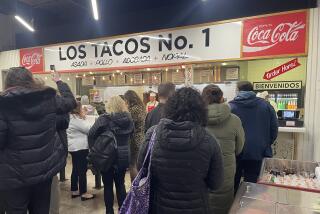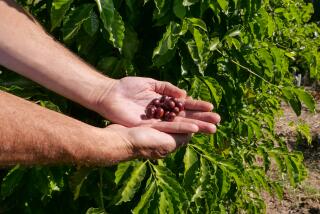Market Watch: In Ojai, hot chiles and a warm story
Most native-born French recoil from chiles as if from snakes, but in the Basque country of the Pyrenees foothills, five miles from the Spanish border, the citizens of Espelette adore a unique local pod called the Espelette, conical, 3 to 4 inches long and medium hot, with thin flesh and many seeds. After harvest in late summer and fall, the vermilion pods are strung in ristra-like cordes, dried in the sun, roasted in bread ovens and ground into richly perfumed red-orange powder, with hints of hay, ripe tomatoes and toast.
It’s rare to find anyone in the United States who produces a local version of this distinctive powder, but in Ojai, that hotbed of local, artisanal and organic agriculture, Steven Sprinkel and his wife, Olivia Chase, make an excellent version, with just the right balance of flavor and heat. They grow Espelette among some 40 varieties of chiles and specialty sweet peppers, raised for the Farmer and the Cook, a combination of farm, restaurant, grocery and community-supported agriculture (CSA) program, with a story as colorful as its produce.
Sprinkel, 61, was born in Altadena and worked in heavy construction before he became a back-to-the-land hippie. He was smitten by farming when he heard Alan Chadwick, a legendary founder of biodynamic horticulture, speak at Santa Cruz in 1970. Sprinkel had a restless streak, and over the next four decades he farmed at several dozen locations, from Escondido and Goleta to Texas and Hawaii; he also was an early vendor at the Santa Barbara farmers market, and he sold at the Santa Monica farmers market from 1986 to 1990.
Chase, petite and elegant in a natural way, with a ready laugh, was born in Seattle. She was running a bakery in Ventura in the 1980s and would buy from Sprinkel at farmers markets. She visited his farm in Carpinteria in 1989 and remembers thinking, “Wouldn’t it be great to operate a restaurant and a farm together?” They were both married to other people at the time, and he soon went off to Texas; but a decade later, when they were both divorced, he was back farming locally, and they linked up after she bought kabocha from him at the Ojai farmers market.
Sprinkel was tired of driving to farmers markets, and Chase’s mother owned a vacant, decrepit store in Meiners Oaks, west of Ojai, which was available cheaply. The Farmer and the Cook, a restaurant and grocery offering only organic food, opened in July 2001. It struggled for the first two years but gradually became a favorite local hangout, home to bikers and artists, stoners and retirees. Sprinkel established a CSA program and cut back to selling at just one farmers market, in Ojai.
He now farms on 12 acres rented from Ventura County on the western edge of the Ojai Valley. In addition to hot and sweet peppers, he raises a diverse range of seasonal vegetables and greens, including tomatoes, squash, Brussels sprouts, corn and potatoes.
There’s considerable synergy between the farm and the restaurant. “If I have a bent cucumber or tomatoes that are cracking, so I really can’t sell them at the market, we’ll just take them to the restaurant and use them in the salad bar or prep them for pizza sauce, tomato soup or pico de gallo,” says Sprinkel.
He started growing chiles in 1984 when he lived with a Mexican family, but mostly to eat the pods themselves and as a hobby. Later that decade he raised chiles commercially to sell wholesale to Whole Foods, when the chain had just a few stores in Texas. More recently, in 2009, he planted chiles to supply the restaurant after Chase reoriented the menu to specialize in Mexican dishes.
Ojai is a good place to grow chiles because it’s hot and dry in summer, says Sprinkel. Last April, 20 volunteers showed up for a planting party, but a few days later, as a late freeze loomed, they were barely able to avert disaster by placing 1,600 Dixie cups over the young plants to protect them.
Chase is the seed sleuth, tracking down rare varieties from catalogs and, in the case of the Espelette, from New Mexico State University’s Chile Pepper Institute. This year she planted a double row of this variety, 350 feet long, enough to make about 60 (2-ounce) jars of coarsely ground powder, which sell for $14. (That may not sound like a lot, but a pinch goes a long way.)
Just after dawn on a recent morning, Chase and Sprinkel walked through the rows of the chile patch, through healthy green plants, still wet with dew, laden with red pods. In previous weeks, most of the chiles were green, and they were selling them fresh, but now most were red and it was time to make dried chiles and powder, they said. They harvested a bucket of large, thick-fleshed jalapeños for Chase and an assistant to smoke, dry and grind into chipotle powder, back at the restaurant.
Chase took a bite of an Espelette and noted that the skin was too tough for it to make good eating fresh; but when dried and ground it offers a perfect blend of flavor and heat, with a finesse that makes it the Champagne of chile powders.
(As with Champagne, the French government accorded the precious pepper an Appellation d’Origine Contrôlée, a protected geographical designation that allows only the production of the Espelette area to be called “Piment d’Espelette.” So formally the Ojai production should probably be called “Espelette-type pepper powder” or something of the sort.)
The Espelette pepper is a variety of Capsicum annuum, like Thai hot, Shishito and cayenne chiles, all of which Sprinkel and Chase grow. The cayenne chile powder is somewhat hotter but less aromatic than the Espelette. A similar pepper, and one of Chase’s favorites, is the India Jwala. She is also planning to make a sweet paprika-like powder from non-pungent Spanish pimiento peppers.
Chase finds habañero to be too hot, but one of her new favorites is the Datil, a bright orange chile that originated in Florida with much of the type’s heat and intense, aromatic fruitiness. She’ll be making hot sauce out of it, she says.
For those who like it really hot, another Ojai grower, Frank MacDoran of Dancing Crow Farm, makes small quantities of habañero powder and sells at the local farmers market. And Windrose Farm of Paso Robles often brings a few superbly smoky chipotles to the Santa Monica Wednesday market.
More to Read
Eat your way across L.A.
Get our weekly Tasting Notes newsletter for reviews, news and more.
You may occasionally receive promotional content from the Los Angeles Times.






